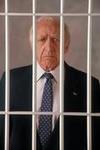|
|
Arrests of
Elderly Rising in Prescription Drug Sales
By Roger Alford, The Associated Press
December 13, 2005

After being fingerprinted and photographed, 87-year-old Dottie Neeley sat quietly in the jail, imprisoned as much by the tubing from her oxygen tank as the concrete and steel surrounding her.
The elderly woman who sometimes uses a wheelchair is among a growing number of senior citizens charged in a crackdown on the illegal trade of prescription drugs, a crime that authorities say is rampant in central Appalachia.
Floyd County jailer Roger Webb said seniors have a ready market for their prescription pills, especially painkillers.
"When a person is on Social Security, drawing $500 a month, and they can sell their pain pills for $10 apiece, they'll take half of them for themselves and sell the other half to pay their electric bills or buy groceries," Webb said.
Since April 2004, the anti-drug task force Operation UNITE has charged more than 40 people 60 or older with selling drugs in the mountains of eastern Kentucky. It's a recent trend that Webb said has been growing.
"It used to be a rare occasion to have an elderly inmate," Webb said.
Dan Smoot, a former state police drug detective who heads the task force, said the senior citizens being charged aren't always struggling to put food on the table.
"Most of the elderly we arrest are merely continuing a family tradition," he said. "It has been part of their culture for a long time."
In nearby Pike County, jailer Rodney Scott said the overall increase in elderly inmates is small, but noticeable. He said senior citizens have more health problems than younger inmates, which means they require more time and attention from his staff.
The Rev. Doug Abner, pastor of Community Church in Manchester and an anti-drug crusader, said seniors may not understand the seriousness of selling prescription drugs.
"They justify it because they're having a hard time financially," he said. "Left to ourselves, we can justify anything, but they're really part of the problem."
Dr. Anita Cornett, a Hyden physician, said she does random drug screenings to make sure her patients are taking their prescription drugs instead of selling them.
In addition, staffers routinely call patients and ask them to bring their prescription bottles into the office to count the pills.
Cornett said one of her patients, a reformed drug addict, told her that he had never purchased drugs from a known drug dealer. "All of the drugs he bought were from elderly people who had prescriptions for them," she said.
Neeley, the 87-year-old who was arrested along with her son and his girlfriend, faces up to 10 years in prison if convicted of trafficking in prescription drugs and marijuana.
However, a prosecutor has agreed to a five-year sentence and has promised not to oppose "shock probation" if Neeley enters a guilty plea at her next scheduled court appearance. Under shock probation, a defendant who is unlikely to repeat the crime is released from prison after getting a taste of life behind bars.
|
|



